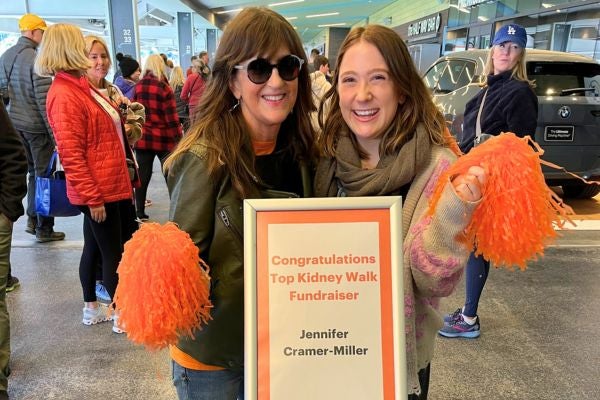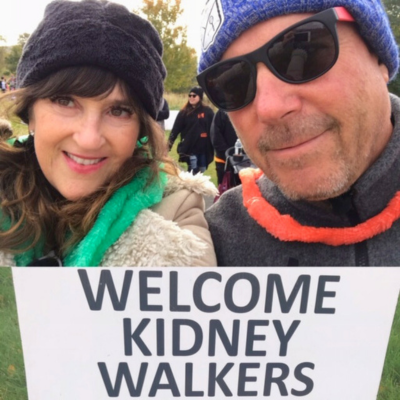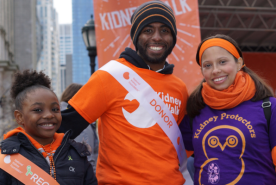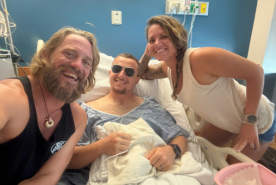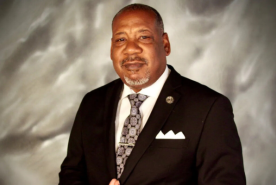July 24, 2025
With four kidney transplants behind her, Jennifer now empowers others with kidney disease through her work with NKF.
Jennifer Cramer-Miller (L) and daughter, Liza (R)
Jennifer Cramer-Miller has been through a lot–four kidney transplants, years on dialysis, and a disease that kept coming back.
But she never let these circumstances keep her down. Instead, Jennifer became a beacon of hope for others.
Diagnosed with FSGS
When Jennifer was 22, she was a healthy, happy college graduate living with her best friend in Seattle, ready to start her adult life.
Then, one morning, everything changed.
“I woke up puffy. I went to the doctor expecting to get diagnosed with a virus or something easily treatable,” said Jenifer. “I never expected to learn that my kidneys were damaged.”
Jennifer was diagnosed with albuminuria (proteinuria), or protein in her urine. Protein belongs in the bloodstream, not the urine. It is a sign that the kidneys are not functioning correctly.
“I went home to Minneapolis to get a kidney biopsy,” Jennifer said. “My father, a custom house builder, built a home for a nephrologist. He wanted me to meet him.”
Jennifer’s test showed scarring in the kidneys’ glomeruli, the small filtering units that clean the blood.
“I was diagnosed with Focal Segmental glomerulosclerosis or FSGS,” said Jennifer. “It is an incurable disease that can recur even after transplantation.”
Living with Kidney Failure
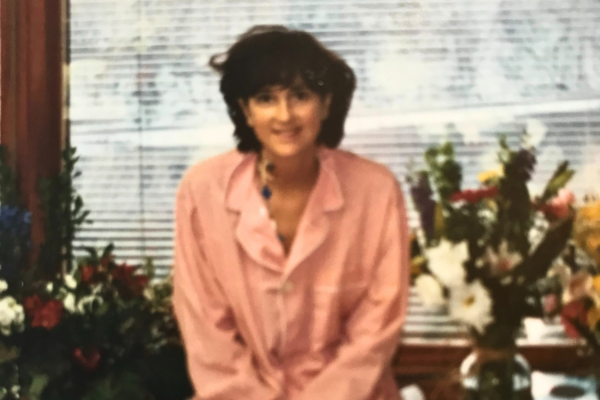
Within six months of diagnosis, Jennifer had kidney failure.
“It was so hard to have kidney failure as a 23-year-old,” Jennifer said. “There are only two routes to treat it–dialysis or kidney transplantation.”
While Jennifer waited for a kidney transplant, she started in-center hemodialysis.
“I wasn’t living the life my friends were living,” Jennifer said. “On the bright side, I developed a great camaraderie with the other dialysis patients, even though they were older than me.”
Jennifer powered through dialysis for almost two years before getting the call she’d been waiting for.
“There was a kidney for me! I was thrilled,” said Jennifer. “I thought I’d get the transplant and go back to Seattle to pick up where I left off.”
But the FSGS returned just three days after the transplant. Jennifer was devastated.
“I was 25, worrying I’d never live a meaningful life,” Jennifer said. “Then I realized I was given a gift from the family of a deceased donor. I had to make the best of my life to honor them.”
Jennifer set out to make memories with the kidney.
“I didn’t know how long I would have with it, so I made the best of it. I enjoyed having fewer fluid and food restrictions,” Jennifer said. “I finished my Master's degree and got married.”
Visit the Kidney Learning Center to learn more about kidney disease treatments, transplant, and living donation.
Subscribe today!
Join the NKF Blog Newsletter
Get inspirational stories and kidney disease resources delivered to your inbox every month. You'll gain practical insights and expert advice to help you better understand and manage your kidney health, no matter where you are on your kidney journey.
The Transplant Journey Continues
Jennifer’s first kidney lasted for five years and three months before failing. She went back on dialysis and the kidney transplant waitlist.
“I was lucky to only need dialysis for 5 months before a kidney became available for me,” Jennifer said. “I'll always have FSGS, but it didn’t occur immediately like the first time.”
This kidney lasted for almost seven years. During that time, Jennifer earned work promotions and had a baby.
“I was managing this really hard disease and living a great life,” Jennifer said. “I was sad it failed, but thrilled it gave me the chance to have a healthy child. I was so happy to be a mom.”
Jennifer’s own mother had wanted to donate a kidney to her. But her antigens were not a match.
Antigens are proteins that the immune system uses to recognize what belongs in the body and what doesn’t. The closer the antigens match between a donor and recipient, the lower the risk of rejection.
Over time, Jennifer’s antigens changed, which can happen with transplant recipients. This meant they were a match this time.
“I was hesitant to have her go through with the surgery because she’d already done so much for me. But she wouldn’t take no for an answer,” Jennifer said. “She donated to me before I needed dialysis.”
Kidney Exchange Program Saves the Day
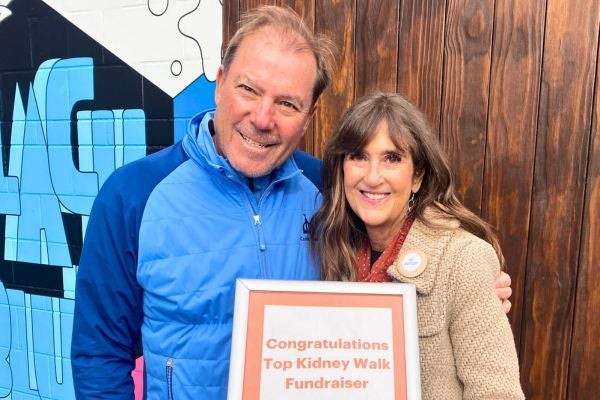
Jennifer's husband (L) and Jennifer (R)
This kidney lasted for 8 years before the FSGS returned.
“My transplant failed. I decided to do home hemodialysis this time,” Jennifer said. “I also did chemotherapy for a year to calm my immune system.”
During that year, 15 friends and family members began the living donor evaluation process.
“Nobody was a match,” Jennifer said. “My husband, though, was a good donor candidate and very determined to donate a kidney for me.”
He signed up for a paired kidney exchange program.
“He donated a kidney to a stranger so I could get a kidney from a different stranger,” said Jennifer. “My donor was a 25-year-old altruistic donor.”
Jennifer’s 4th transplant is still going on, fourteen years and counting.
Take our quick quiz to find out if home dialysis is right for you.
Giving Back to the Kidney Community
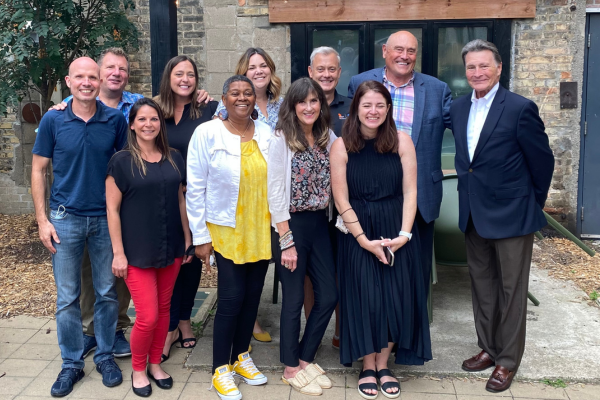
NKF Board Serving Minnesota
Jennifer’s kidney journey hasn’t been easy, but it has been filled with an incredible amount of kindness from strangers and loved ones alike.
“I have so much gratitude and wanted to give back,” Jennifer said. “That led me to the National Kidney Foundation (NKF). I became an NKF Peers mentor to share my experience with others.”
Today, Jennifer serves as the board chair for NKF Serving Minnesota, using her voice and lived experience to make a difference.
“For me, life has felt like a string of miracles,” Jennifer said. “People are shocked that I’ve had four kidney transplants. I’m here because of the generosity of others and the progress of modern medicine.”
It’s this combination of generous gifts, medical improvement, and community support that fuels Jennifer’s work with NKF.
“At NKF, we’re working hard to prevent kidney disease, improve health equity, and support innovation,” she said. “It’s an amazing way for kidney patients, their loved ones, and professionals to come together and create real change.”
These values also inspired Jennifer to write her book, Incurable Optimist: Living with Illness and Chronic Hope.
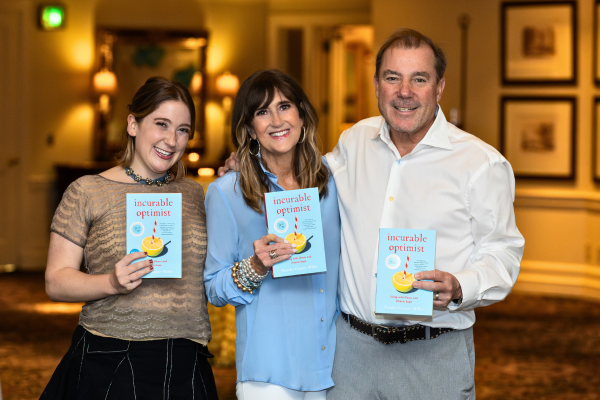
“I want to help others manage uncertainty and still find joy in their lives,” said Jennifer. “Even during the hard times, I believe there’s always something to be hopeful for.”
Get Involved
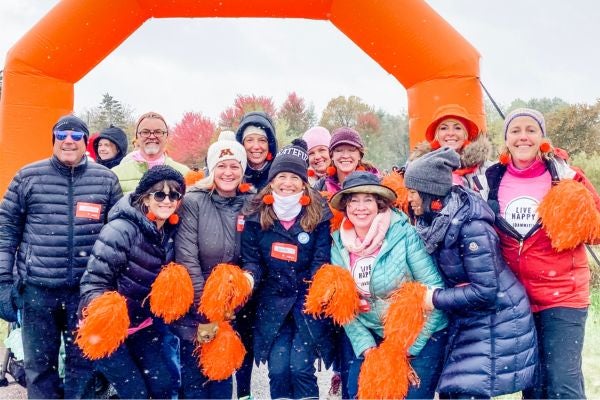
We invite you, whether you have kidney disease or know someone living with it, to get involved with NKF. Your support helps us improve kidney care for all.
- Find a Kidney Walk near you: Join forces with your local kidney community to raise funds and kidney disease awareness for a better future for everyone affected by kidney disease.
- Join Voices for Kidney Health: Become an NKF kidney advocate to help fight for policies that benefit kidney patients and those at risk.
- Donate: Your contributions enable NKF to continue advocating for better kidney policy, helping people get diagnosed early, and increasing kidney transplantation.
- Become a Peer Mentor: Mentors are kidney patients or care partners who have experienced dialysis, received a transplant, or are living well with kidney disease.
